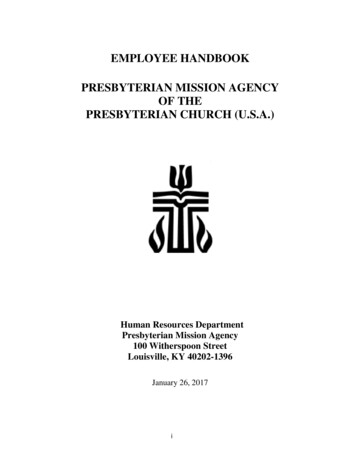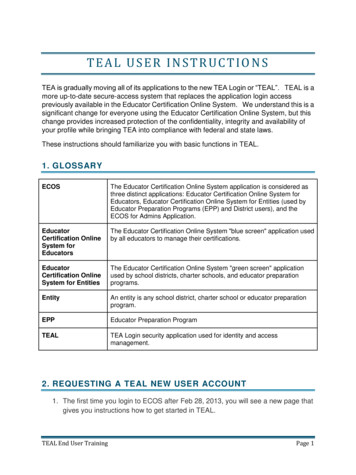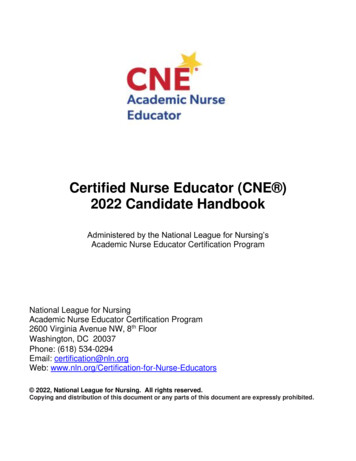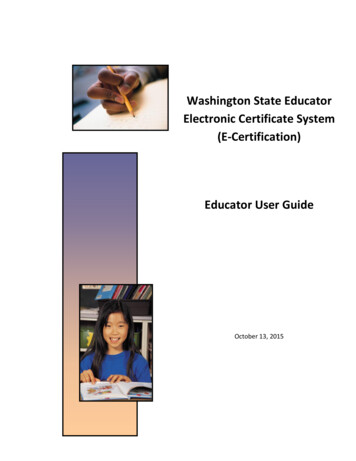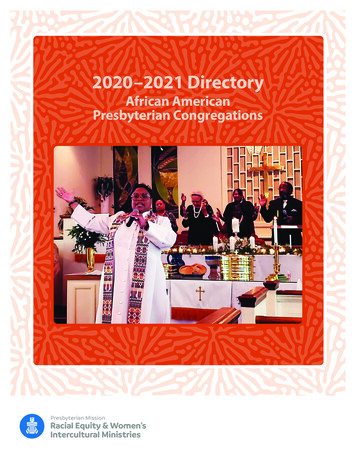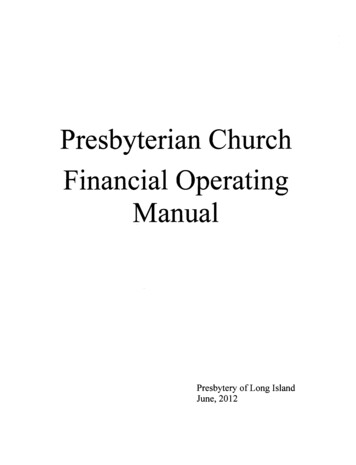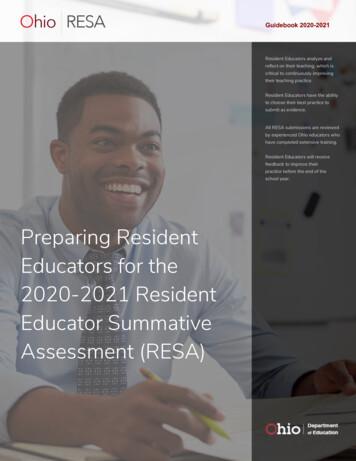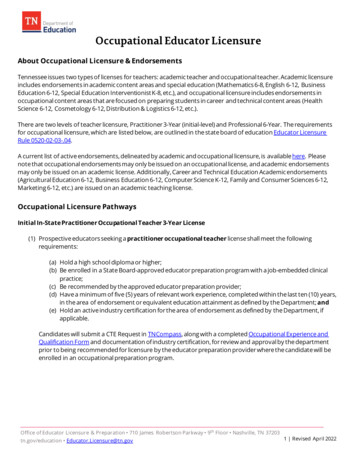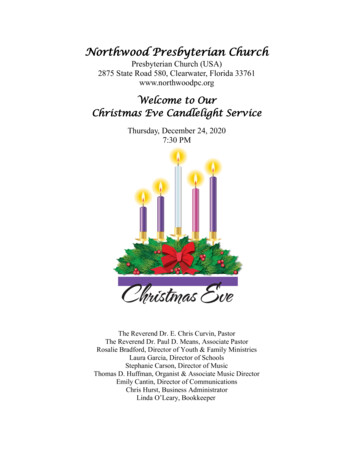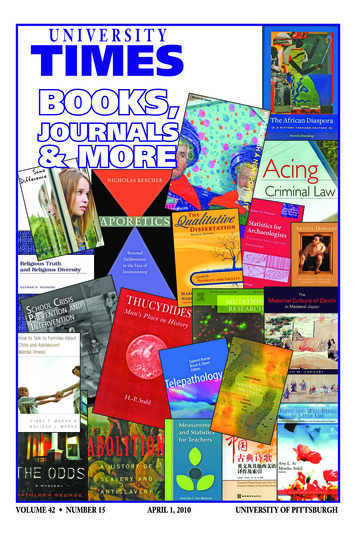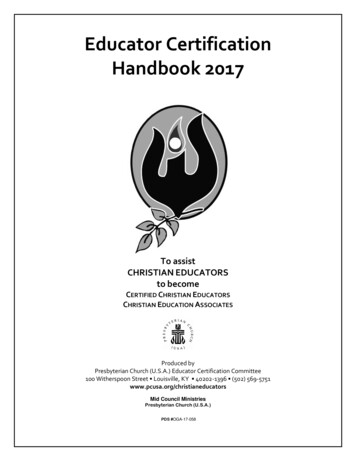
Transcription
Educator CertificationHandbook 2017To assistCHRISTIAN EDUCATORSto becomeCERTIFIED CHRISTIAN EDUCATORSCHRISTIAN EDUCATION ASSOCIATESProduced byPresbyterian Church (U.S.A.) Educator Certification Committee100 Witherspoon Street Louisville, KY 40202-1396 (502) 569-5751www.pcusa.org/christianeducatorsMid Council MinistriesPresbyterian Church (U.S.A.)PDS #OGA-17-058
Educator Certification Handbook – 2017Table of ContentsIntroduction . 2THE PROCESS AND ITS STANDARDSThe Church and Christian Educators . 4Participants in the Certification Process . 6The Certified Christian Educator (CCE) .12Work Experience and Educational RequirementsSteps in the Certified Christian Educator ProcessThe CCE ExaminationThe Christian Education Associate (CEA) .21Work Experience and Educational RequirementsSteps in the Christian Education Associate ProcessThe CEA ExaminationThe Certification Advisor .26The Reference Group .33Educator Certification Handbook 20171
IntroductionThe HandbookThis handbook has been developed primarily for the use of Educator Certification Advisors asthey work with persons seeking to be Certified Christian Educators or those seeking to beenrolled as Christian Education Associates. A print version of these materials can be placed in abinder and kept for use when helping an educator who asks about certification or whensomeone is identified for whom the certification process would seem appropriate. Other helpfulmaterials can also be added to enhance the work of educators in the Presbytery. All of thiscontent can be found online at www.pcusa.org/christianeducators. This website can be ahelpful source when looking for a particular form or specific information related to educatorcertification.Although the Educator Certification Committee has made every attempt to work out the detailsof the process, we recognize that there may be omissions or errors in the handbook. From timeto time, you may receive notifications about revisions to the handbook. The most recent versionwill always be available on the website.Why Certification?In the late nineteenth and early twentieth centuries, continuing development in the field ofChristian education brought about the emergence of professionally trained leaders whose focusin ministry was on the nurture and education of persons in their faith. Some were pastors in thechurch, but many were skilled and dedicated persons who felt a call to ministry but not to theministry of Teaching Elder. Over the ensuing decades, their gifts and services as "educators" inthe church have enriched the lives of countless numbers of people and contributed to theformation of a rich history of professional leadership by church educators. In recognition of thathistory and because of the importance of Christian Education to the total ministry of the church,the Presbyterian Church (U.S.A.) sought to recognize and to enhance the ministries of personsemployed as professional Christian educators by certifying them as Certified ChristianEducators or Certified Associate Christian Educators, or by enrolling them as EnrolledEducational Assistants. Certification was then granted at the end of an intensive process ofpreparation, study, service, and examination.Now, as we live into the twenty-first century, much has changed in the church and in the field ofChristian Education but this does not mean that educational ministries in congregations havelessened in importance. In fact, it is critical that congregations have every opportunity for thevery highest quality of educational ministry to insure that disciples of Christ will continue to bemade now and in the future.As the church changes, so must the process of certification of Christian educators. To that endthe PC (USA) still seeks to recognize and enhance the ministries of persons called to serve thechurch as Christian educators by certifying them as Certified Christian Educators or by enrollingthem as Christian Education Associates.2Educator Certification Handbook 2017
The Purpose of this process is:1. To continue to set standards for the preparation and performance of Christian educators,both professional and volunteer.2. To acknowledge and clarify the mutual accountability between the denomination’scouncils and the Christian educator.3. To set specific achievable goals for the on-going development of Christian educatorsand to foster support for them as they pursue these goals.4. To lift up the need for continuing education for Christian educators so that thoseproviding oversight may provide time and money.5. To provide levels of educational leadership that will assist denominational councils indefining their own needs and in determining just compensation, commensurate with thelevel of their need.Ordinarily, Those applying for the level of Certified Christian Educator (CCE) have a master’sdegree or a bachelor’s degree from an accredited institution or its equivalent (previouslyachieved the level of Certified Associate Christian Educator, Enrolled EducationalAssistant or Christian Education Associate)Christian Education Associates (CEA) – formerly Enrolled Educational Assistants are not required to hold a degree but have entered the process of formal preparation forcertification by successfully completing a number of basic requirementsIn recognition of the fact that there are only select places where someone may go to receive amaster’s or bachelor’s degree in Christian education, the certification process has beendesigned so that many qualified persons who have entered the field through volunteer serviceand part-time employment in the field, may become certified. In fact, it is possible for a personwho does not hold any baccalaureate degree to become certified. To do so, one must completerigorous programs of continuing education and multiple-step examination processes designed toensure that those who complete this process are equipped in training and skill as those whohold the degrees.Both formal and informal academic preparations are considered in the certification process. Inaddition, significant emphasis is placed upon competent performance, exhibited by experience.The process is designed to be a means of growth for the educator; not only measuring theeducator’s competence but also helping the educator define needs for additional education. Inall cases and at both levels, an educator who is certified, enrolled, or otherwise engaged in theprocess of preparation for certification is a person who has submitted his or her credentials to athird party, in this case, to the Educator Certification Committee (ECC) through the EducatorCertification Coordinator/OGA Staff person (hereafter, Coordinator) for an independent, peerreview of his or her gifts for this ministry.Educator Certification Handbook 20173
The Church and Christian EducatorsThe certification process outlined in this handbook attempts to faithfully fulfill the requirementsfor preparation, examination, and admission to the rights, privileges, and responsibilities of theCertified Christian Educator as described in the constitution of the Presbyterian Church (U.S.A.).As you read and use it, you will note that the Form of Government, one of the sections of theBook of Order, addresses the ministry of Certified Church Service as well as specifying the skillsand training of the Certified Christian Educator. It is the constitutional provision for the CertifiedChristian Educator and the former level of Certified Associate Christian Educator. The entrylevel for certification, Christian Education Associate (formerly Enrolled Educational Assistant), isnot reflected in the Form of Government. It is an entry level whereby educators who hold nodegree may enter the process and work toward certification if they so choose, and is a way thechurch recognizes the gifts and ministries of persons while encouraging them in their continuingeducation. As such, there are steps in the ongoing process of lifelong learning common to alleducators.The constitutional provisions describing the preparation, examination, and rights of certifiedChristian educators are found at the end of chapter two of the Form of Government (G-2.11Certified Church Service). The relevant sections are as follows:G-2.1101Forms of Certified Church ServicePersons may be certified and called to service within congregations, councils, and church-related entities,serving in staff positions. These individuals endeavor to reflect their faith through their work and tostrengthen the church through their dedication. They should be encouraged by their session andpresbytery to meet, or be prepared to meet, the certification requirements in a handbook provided by anational certifying body approved by the General Assembly. Names of those who have earnedcertification through a national certifying body shall be transmitted to the appropriate body of the GeneralAssembly, which will forward them to the stated clerk of the presbyteries in which those persons labor.G-2.1102Presbytery and Certified Church ServiceThe presbytery shall encourage sessions to make continuing education funds and time available to thoseseeking certification, and shall affirm the skill and dedication of these certified persons by providing aservice of recognition at the time of certification. The presbytery may grant the privilege of voice at all itsmeetings to persons in certified church service.G-2.1103a.Christian EducatorsSkills and TrainingCertified Christian educators are persons certified and called to service in the ministry of education incongregations or councils. They shall have skills and training in biblical interpretation, Reformed theology,worship and sacraments, human development, faith development, religious educational theory andpractice, and the polity, programs, and mission of the Presbyterian Church (U.S.A.).b.Presbytery ResponsibilityThe presbytery shall establish minimum requirements for compensation and benefits for CertifiedChristian Educators and Certified Associate Christian Educators and shall provide access to the area ofpresbytery that oversees ministry (G-3.0307). During their term of service in an educational ministry underthe jurisdiction of the presbytery, Certified Christian Educators are entitled to the privilege of the floor with4Educator Certification Handbook 2017
voice only at all presbytery meetings, and in the case of Certified Christian Educators who are rulingelders, the privilege of voice and vote at all its meetings.Other sections of the Form of Government that apply to Christian educators are asfollows:G-3.0303c[Presbytery] Relations with Sessionsc.establish minimum compensation standards for pastoral calls and Certified ChristianEducators and Certified Associate Christian Educators within the presbytery;G-3.0307Pastor, Counselor, and Advisor to Teaching Elders and CongregationsPresbyteries shall be open at all times to communication regarding the life and ministry of theircongregations.Each presbytery shall develop and maintain mechanisms and processes to serve as pastor andcounselor to teaching elders, ruling elders commissioned to pastoral service, and certified Christianeducators of the presbytery; to facilitate the relations between the presbytery and its congregations,teaching elders, ruling elders commissioned to pastoral service, and certified Christian educators; and tosettle difficulties on behalf of the presbytery where possible and expedient G-4.0302Mandatory ReportingAny member of this church engaged in ordered ministry and any certified Christian educator employed bythis church or its congregations, shall report to ecclesiastical and civil legal authorities knowledge ofharm, or the risk of harm, related to the physical abuse, neglect, and/or sexual molestation or abuse of aminor or an adult who lacks mental capacity when (1) such information is gained outside of a confidentialcommunication as defined in G-4-3-1, (2) she or he is not bound by an obligation of privilegedcommunication under law, or (3) she or he reasonably believes that there is risk of future physical harm orabuse.Educator Certification Handbook 20175
Participants in the Certification Processand Their RolesThere are six key participants in the certification process: the Educator, the EducatorCertification Advisor, the Reference Group, the Educator Certification Committee, theCoordinator, the Session, and the Presbytery.The EducatorThose who seek certification are professionals or volunteers with a call to a particularministry within the church. While many are Teaching Elders, the majority of Educatorswho are certified or enrolled are not Teaching Elders. They are seeking certification as away of enhancing their own continuing education, submitting their credentials for peerreview, and maintaining the highest possible standards for ministry preparation,leadership and accountability, thus uplifting the significance of educational ministry forthe whole church.The Educator Certification AdvisorThe Educator Certification Advisor provides a link between the Educator CertificationCommittee, the presbytery, and educators seeking to become Certified ChristianEducators or Christian Education Associates. The Educator Certification Committee andthe presbytery choose the Educator Certification Advisor in partnership. The Advisorworks with the ECC in relation to the certification requirements, and with the presbyteryor its designated committee in relation to the support and accountability of the presbyteryfor the applicant’s educational ministry.The Educator Certification Advisor should have the following qualifications: A heart for Christian education Member of the PC(USA) Experience in educational ministry and, if possible, be a CertifiedEducator A willingness to participate in training (training is available at selectedevents and through an online process atwww.pcusa.org/christianeducators)The Educator Certification Advisor has a number of key responsibilities,including the following:oTo become and remain informed about the certification process, and toprovide this information to educators, sessions and committees of thepresbyteryoTo meet with each applicant for certification or enrollment to review theprocess and the requirements, and to advise the applicant regarding theappropriate level for which to applyoTo review with the applicant all applicable qualifications, and to assist the6Educator Certification Handbook 2017
Educator in finding ways to satisfy unmet requirementsoTo assist the applicant for certification in the selection of a Reference Groupand to serve as one member of that Reference Group as the presbytery’sappointeeoTo go to the Session or appropriate council, with the Educator, to explain theprocess and to advocate for support (i.e., time and money) for this process ofcontinuing educationoTo inform the Coordinator that the Advisor is satisfied with the educators’readiness to proceed to the exam phase using the Exam Readiness Form forAdvisor OnlyoTo convene and moderate the Reference Group as it reviews and evaluatesthe Educator’s responses to examination questions, and to process theresults of that review. PLEASE NOTE: The Educator CertificationCommittee will not accept exams for reading if they have not beenapproved by the Reference Group and the AdvisoroTo obtain verification of ministry (employed or volunteer) of the Educatorupon completion of the examination or readingsoTo assist the Educator in fulfilling other requirements and responsibilitiesestablished by the presbytery, which might include preparing and presentinga statement of faith, assisting in the writing of a position description, andreviewing the adequacy of compensation with the denominational counciloTo plan with the Educator and the presbytery an appropriate service ofrecognition of the certificationoTo identify ways in which the Educator can overcome deficiencies identifiedby the ECC upon receipt of the evaluation of the Educator CertificationCommittee.oTo function as an advocate for the certification process as a means forinsuring excellence in the educational ministry of the church - especially forthe presbytery's churches, pastors, and educatorsoTo fulfill any other requirements outlined by the presbyteryThe person serving as the Educator Certification Advisor should be someone whothoroughly understands the Presbyterian system and knows both the structure andfunctioning of the particular presbytery in which he/she serves. The person will find ithelpful to have a strong background in Christian education, to be certified or seekingcertification, and/or be supportive of the concept and the process of certification.More detail on the role of the Certification Advisor is available in the section of theHandbook entitled “The Certification Advisor.”Educator Certification Handbook 20177
The Reference GroupThe Reference Group will include:o A staff colleague (selected by the Educator). This individual should not be thespouse of the Educator;o Another Christian educator, preferably certified, who knows the Educator’s work(selected by the Educator);o Representative appointed by the Session or denominational council to whom theEducator is responsible;o The Educator Certification Advisor, who serves as moderator/convener of thegroup;o A representative from the appropriate committee of presbytery (if available)The Reference Group is expected to:o Meet various times with the Educator to provide support and encouragement;o Review and comment on the Educator’s exam before it is sent in its final form tothe Educator Certification Committee;o Provide insight into the Educator’s ministry and personal competencies via use ofthe General Reference Group Comments form at the end of the examinationphase;o Decide to recommend or not to recommend the Educator for certification to theEducator Certification Committee.More detail on the role of the Reference Group is available on the section of theHandbook entitled “The Reference Group.”The Educator Certification Committee (ECC)The Educator Certification Committee is made up of nine persons serving four-yearterms at the appointment of the appropriate agency of the Presbyterian Church (U.S.A.).Criteria for ECC Membership (in order of importance):1. All members will be members of the Presbyterian Church (U.S.A.)2. All members will have skills in evaluating educational competencies.3. All members, when possible, shall be Certified Christian Educators.4. Representation by men and women, lay and clergy, and racial/ethnic.5. Representation from as diverse geographical areas and across age linesas possible.To fulfill the above, the following criteria have been established for ECC membership:1. At least one person who currently serves as a Director of ChristianEducation.2. At least one person who serves, or has served, on the staff of a midcouncil.3. At least one pastor serving a church that employs a church educator.4. At least one faculty or staff member of a PC (USA) theological school.5. At least one associate pastor who serves primarily in Christian education.6. At least one racial/ethnic representative.8Educator Certification Handbook 2017
In addition, appointed members represent a Presbyterian seminary which provides adegree program in Christian Education and the Association of Presbyterian ChurchEducators (APCE).The ECC meets at least once yearly, usually in the late fall or late spring, with electronicmeetings throughout the year. The ECC is funded by per capita through the PC (USA)Office of the General Assembly and its minutes are subject to review by that body. TheECC elects a moderator from among its members. The Coordinator, as a staff person ofthe Presbyterian Church (U.S.A.), is responsible for all administrative functions within theapplication and certification process. Nominations to the Educator CertificationCommittee take place through the General Assembly Nominating Committee process.Applications are available at www.pcusa.org/nominations.The Educator Certification CoordinatorThe Coordinator is a member of the Presbyterian Church (U.S.A.) Office of the GeneralAssembly staff. The Coordinator receives and processes applications, transcripts,examinations, and evaluations. The Coordinator makes judgments about the adequacyof materials received and may correspond with the applicant and/or the Advisor. If thereare any questions related to the information submitted on the application and itsapplicability to the requirements, the Coordinator will delay any further action until theECC can review the application.The Coordinator attends Educator Certification Committee meetings and assists ECCmembers as they review the files of applicants. The Coordinator communicates ECCdecisions to those affected by them, and submits lists of Certified Educators so that theymay be included in the online directory provided by the Office of the General Assemblyand the APCE (Association of Presbyterian Church Educators) communications.While the Coordinator is prepared to assist applicants and Advisors regarding particularapplications, she/he does not make, nor is expected to defend the actions that are theresponsibility of the Educator Certification Committee.The Educator Certification Coordinator can be contacted at:100 Witherspoon StreetLouisville, Kentucky 40202-1396Telephone: (502) 569-5751Martha.Miller@pcusa.orgThe SessionGenerally speaking, “Session” refers to the Session of the congregation in which theeducator serves. Some educators, of course, may not be directly related to a Session. Insuch cases, the committee or Board of the agency or council to which the educatorrelates will serve the same functions and will be involved at the same points as theSession.The Educator should advise her/his Session when beginning the CCE/CEA process.Educator Certification Handbook 20179
Early involvement is essential so that the Session may be encouraged to providecontinuing education assistance (time and funding) for the Educator while completingcourse work in order to meet the educational requirements. In addition, the Session canbe an advocate for the Educator as he/she continues the process.There are several places in the process when the Session will be formally involved:1. When the Educator has made formal application, the clerk of Session or otherappropriate agency or council will receive communication asking for their support asthe Educator works through the process. At this same time, if the Educator is avolunteer, there will be verification requested.2. When the Educator is ready to begin the examination phase of the process, the clerkof Session or other appropriate agency or council will receive communication askingthe clerk to appoint a representative to serve as a member of the Reference Groupfor the Educator.3. During the Examination Phase, a Verification of Ministry Form will need to becompleted and signed by the individual to whom the Educator is most directlyaccountable. This may be one of several people such as the Church BusinessAdministrator, Christian Education Committee Chairperson, the PersonnelCommittee Chairperson or the Moderator.4. When CCE/CEA is granted, the Clerk of Session will be formally notified. Thisnotification suggests the appropriateness of the congregation/Session, agency orcouncil formally recognizing the Educator’s achievement.The PresbyteryThe Form of Government of the PC (USA) (G-2.11, G-3.0303, G-3.0307) provides thatthe presbytery:1. encourage those called to service to meet or prepare to meet the certificationrequirements;2. shall encourage sessions to make continuing education funds and timeavailable to those seeking certification;3. shall affirm the skill and dedication of these certified persons by providing aservice of recognition at the time of certification;4. shall establish minimum requirements for compensation and benefits forCertified Christian Educators and Certified Associate Christian Educators;5. shall provide access to the area of presbytery that oversees ministry (G3.0307)6. shall develop and maintain mechanisms and processes to serve as pastorand counselor to teaching elders, ruling elders commissioned to pastoralservice, and Certified Christian Educators of the presbytery;7. facilitate the relations between the presbytery and its congregations, teachingelders, ruling elders commissioned to pastoral service, and Certified ChristianEducators;8. settle difficulties on behalf of the presbytery where possible and expedient.In addition, during their term of service in an educational ministry under the jurisdiction ofthe presbytery, Certified Christian Educators are entitled to the privilege of the floor withvoice only at all presbytery meetings, and in the case of Certified Christian Educatorswho are ruling elders, the privilege of voice and vote at all its meetings.10Educator Certification Handbook 2017
While these passages do not establish a specific process for presbyteries to follow in thecertification of church educators, they do make clear the presbytery’s right andresponsibility to provide oversight for the educator certification process. Somepresbyteries take this responsibility very seriously, placing Educators under care of thepresbytery while they prepare for certification, requiring a statement of faith to bepresented to the presbytery. The following suggestions may be helpful as yourpresbytery considers its role in relation to the certification process:1. Decide which committee of presbytery the Educator Certification Advisor(s) willfunction within. Encourage and support Certification Advisors to participate in thetraining offered by the Office of Certification.2. Discuss the certification process with concerned individuals in the presbytery. Ifthey feel additional requirements or other means of supporting educators throughthe process are necessary, write these up as supplementary to the certificationprocess.3. Prior to the presentation of an individual educator, involve the whole presbyteryto look at the certification process and to approve any addenda added as a resultof (2) above. Listen seriously to questions and concerns and if possible makeadjustments to accommodate them.4. Be vigilant in balancing “requirements” with “benefits.” Remind presbyters thatthe main reason for presbytery’s involvement in the process is to support theEducator and to recognize the importance of his or her contribution to thepresbytery and the church.Educator Certification Handbook 201711
The Certified Christian EducatorMinistry Experience and Educational Requirements for the CertifiedChristian EducatorPersons seeking certification as Certified Christian Educators (CCE) must meet one of thefollowing minimum requirements scenarios:Scenario One: No Prior CertificationooooMembership in the Presbyterian Church (U.S.A)Hold a bachelor’s or a master’s degree from an accredited institutionExperience (volunteer or employed) of one year full-time or its equivalent in Christianeducation ministry within a PC(USA) congregation, council, or agency. *Completion of certification-approved courses in the following knowledge/skill areas (a listof approved courses for PC (USA) educator certification can be found on-line atwww.pcusa.org/christianeducators) –o At least 3 course credits each:Biblical Interpretation - This area includes exegetical skills, but does not include arequirement to know and use the Biblical languages of Hebrew or Greek.Successful completion of the Biblical Exegesis Ordination Exam also fulfills thisrequirement.Reformed Theology - Note the emphasis on "Reformed" theology and theconstitution's emphasis on the "Confessions" as a basis for defining Reformedtheology. The Educator Certification Committee looks for indications that coursesincluded the Confessions and/or extensive reading in the works of Reformedtheologians. Successful completion of the Theological Competence OrdinationExam also fulfills this requirement.Religious Education Theory and Practice - This area should be current anddemonstrate an ability to integrate theory with practice.Worship and Sacraments – This area includes knowledge of worship andsacraments within the Reformed tradition and the ability to interpret worship andthe sacraments in the educational ministry of the church. Prior completion ofcoursework in Biblical Interpretation and Reformed Theology is suggested andencouraged. Successful completion of the Worship and Sacraments OrdinationExam also fulfills this requirement.Human Growth and Faith Development (within the last 15 years) - Work in thisarea must be life-span, include exposure to faith development, and fall within afifteen-year statute of limitations. It also should include the work of newertheorists especially in cognitive, social and gender issues.oAt least 1.5 credits each (usually offered as one 3 credit course):Presbyterian Polity - The educator must be able to demonstrate both anunderstanding of Presbyterian Church (U.S.A.) polity and pastoral sensitivity inits application. Successful completion of the Church Polity Ordination Exam alsofulfills this requirement.Presbyterian Program and Mission - This area includes knowledge of currentresources and mission emphases of the Presbyterian Church (U.S.A.).Graduation from a PC(USA) seminary also fulfills th
Christian Educators and Certified Associate Christian Educators and shall provide access to the area of presbytery that oversees ministry (G-3.0307). During their term of service in an educational ministry under the jurisdiction of the presbytery, Certified Christian Educators are entitled to the privilege of the floor with
